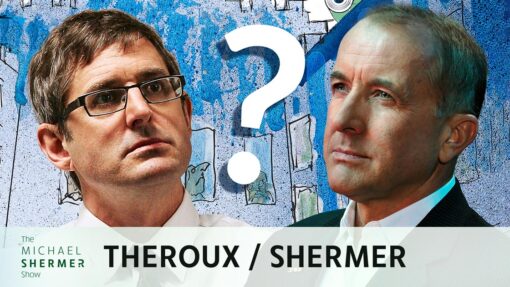self-deception

Moshe Hoffman is a research scientist at the Max Planck Institute for Evolutionary Biology whose research focuses on using game theory and models of learning. Erez Yoeli is a research scientist at MIT’s Sloan School of Management, whose research focuses on altruism: understanding how it works and how to promote it.

Shermer and Theroux discuss: how documentary films are made • religious fanaticism • UFO cults • Scientology • neo-Nazis • anti-Semitism • prisons, pornography, and prostitution • Jeffrey Epstein and Jimmy Savile • self-help movements and gurus • deception and self-deception • social proof and human conformity • are humans naturally rational, irrational, or both?
Michael Shermer Speaks With Louis Theroux About Neo-Nazis, Jimmy Savile, UFO Cults, and Scientology. PLUS: In SRC Report PCIS-006, we take a look at Conspiracy Theory Endorsement by Media Viewership.

In episode 202, Michael Shermer speaks with Julia Galef about why some people see things clearly and others don’t. She distinguishes a “soldier” mindset from a “scout” mindset. Galef and Shermer explore why our brains deceive us and what we can do to change the way we think.
In episode 202, Michael Shermer speaks with Julia Galef about why some people see things clearly and others don’t. She distinguishes a “soldier” mindset from a “scout” mindset. Galef and Shermer explore why our brains deceive us and what we can do to change the way we think.
Whether it’s in a cockpit at takeoff or the planning of an offensive war, a romantic relationship or a dispute at the office, there are many opportunities to lie and self-deceive—but deceit and self-deception carry the costs of being alienated from reality and can lead to disaster. In this Distinguished Science Lecture recorded on November 11, 2011, Robert Trivers explains why deception plays such a prominent role in our everyday lives.
Apple Founder, Steve Jobs, had more than a knack for convincing anyone that seemingly unrealistic things were possible. In this week’s eSkeptic, Michael Shermer discusses how self-deception and a pervasive optimistic bias—Jobs‘s “reality distortion field”—contributed both to his success and his demise.
Whether it’s in a cockpit at takeoff or the planning of an offensive war, a romantic relationship or a dispute at the office, there are many opportunities to lie and self-deceive—but deceit and self-deception carry the costs of being alienated from reality and can lead to disaster. In this Distinguished Science Lecture recorded on November 11, 2011, Robert Trivers explains why deception plays such a prominent role in our everyday lives.











